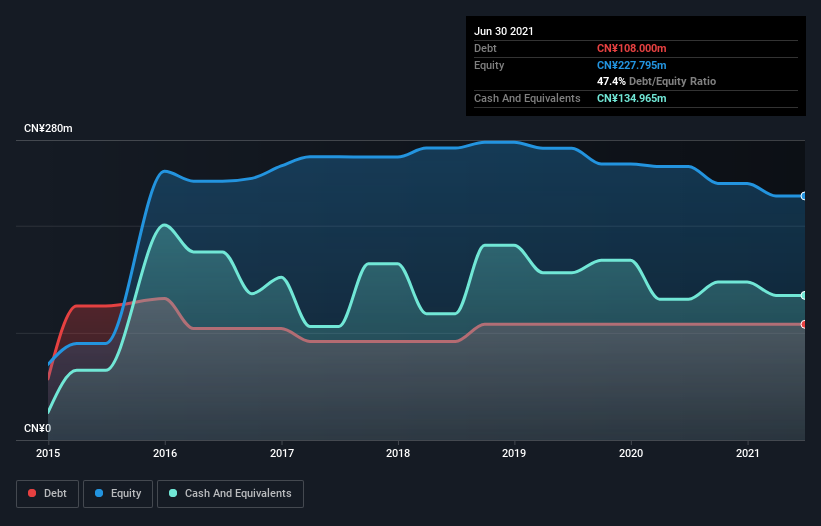- Hong Kong
- /
- Food and Staples Retail
- /
- SEHK:974
Is China Shun Ke Long Holdings (HKG:974) Using Debt Sensibly?
Warren Buffett famously said, 'Volatility is far from synonymous with risk.' So it might be obvious that you need to consider debt, when you think about how risky any given stock is, because too much debt can sink a company. We can see that China Shun Ke Long Holdings Limited (HKG:974) does use debt in its business. But the more important question is: how much risk is that debt creating?
When Is Debt Dangerous?
Debt is a tool to help businesses grow, but if a business is incapable of paying off its lenders, then it exists at their mercy. In the worst case scenario, a company can go bankrupt if it cannot pay its creditors. While that is not too common, we often do see indebted companies permanently diluting shareholders because lenders force them to raise capital at a distressed price. By replacing dilution, though, debt can be an extremely good tool for businesses that need capital to invest in growth at high rates of return. When we examine debt levels, we first consider both cash and debt levels, together.
View our latest analysis for China Shun Ke Long Holdings
How Much Debt Does China Shun Ke Long Holdings Carry?
The chart below, which you can click on for greater detail, shows that China Shun Ke Long Holdings had CN¥108.0m in debt in June 2021; about the same as the year before. However, its balance sheet shows it holds CN¥135.0m in cash, so it actually has CN¥27.0m net cash.

A Look At China Shun Ke Long Holdings' Liabilities
The latest balance sheet data shows that China Shun Ke Long Holdings had liabilities of CN¥286.4m due within a year, and liabilities of CN¥70.9m falling due after that. On the other hand, it had cash of CN¥135.0m and CN¥50.6m worth of receivables due within a year. So its liabilities total CN¥171.8m more than the combination of its cash and short-term receivables.
This is a mountain of leverage relative to its market capitalization of CN¥188.5m. Should its lenders demand that it shore up the balance sheet, shareholders would likely face severe dilution. While it does have liabilities worth noting, China Shun Ke Long Holdings also has more cash than debt, so we're pretty confident it can manage its debt safely. There's no doubt that we learn most about debt from the balance sheet. But you can't view debt in total isolation; since China Shun Ke Long Holdings will need earnings to service that debt. So if you're keen to discover more about its earnings, it might be worth checking out this graph of its long term earnings trend.
Over 12 months, China Shun Ke Long Holdings made a loss at the EBIT level, and saw its revenue drop to CN¥828m, which is a fall of 14%. That's not what we would hope to see.
So How Risky Is China Shun Ke Long Holdings?
While China Shun Ke Long Holdings lost money on an earnings before interest and tax (EBIT) level, it actually generated positive free cash flow CN¥45m. So although it is loss-making, it doesn't seem to have too much near-term balance sheet risk, keeping in mind the net cash. Until we see some positive EBIT, we're a bit cautious of the stock, not least because of the rather modest revenue growth. The balance sheet is clearly the area to focus on when you are analysing debt. But ultimately, every company can contain risks that exist outside of the balance sheet. We've identified 4 warning signs with China Shun Ke Long Holdings (at least 1 which is a bit unpleasant) , and understanding them should be part of your investment process.
If, after all that, you're more interested in a fast growing company with a rock-solid balance sheet, then check out our list of net cash growth stocks without delay.
New: AI Stock Screener & Alerts
Our new AI Stock Screener scans the market every day to uncover opportunities.
• Dividend Powerhouses (3%+ Yield)
• Undervalued Small Caps with Insider Buying
• High growth Tech and AI Companies
Or build your own from over 50 metrics.
This article by Simply Wall St is general in nature. We provide commentary based on historical data and analyst forecasts only using an unbiased methodology and our articles are not intended to be financial advice. It does not constitute a recommendation to buy or sell any stock, and does not take account of your objectives, or your financial situation. We aim to bring you long-term focused analysis driven by fundamental data. Note that our analysis may not factor in the latest price-sensitive company announcements or qualitative material. Simply Wall St has no position in any stocks mentioned.
Have feedback on this article? Concerned about the content? Get in touch with us directly. Alternatively, email editorial-team (at) simplywallst.com.
About SEHK:974
China Shun Ke Long Holdings
An investment holding company, operates and manages supermarket chain stores in the People’s Republic of China.
Adequate balance sheet with low risk.
Market Insights
Community Narratives


Recently Updated Narratives


Alphabet: The Under-appreciated Compounder Hiding in Plain Sight


MINISO's fair value is projected at 26.69 with an anticipated PE ratio shift of 20x


The Quiet Giant That Became AI’s Power Grid
Popular Narratives


The company that turned a verb into a global necessity and basically runs the modern internet, digital ads, smartphones, maps, and AI.


MicroVision will explode future revenue by 380.37% with a vision towards success



